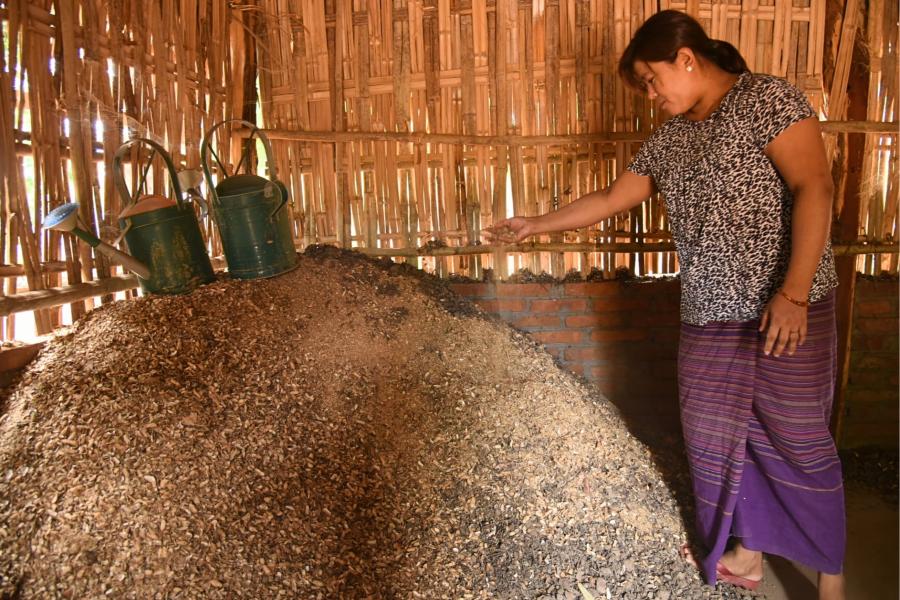From Farmer and Food Vendor to Entrepreneur: Ma Mu Mu Htay's Inspirational Journey

A story about the human development outcomes UNDP hopes to bring to Myanmar's dry zone
In honoring the women of Myanmar, UNDP shines a spotlight on the inspiring journey of Ma Mu Mu Htay, a woman whose story encompasses entrepreneurship and empowerment. Transitioning from her roots as a farmer and noodle vendor to a prosperous natural fertilizer producer in Nyaung U township, Ma Mu Mu Htay's story represents the human development outcomes UNDP hopes to bring to Myanmar's dry zone.
Ma Mu Mu Htay's journey began in the challenging dry zone, where year-round income from limited crops was a constant struggle. Juggling roles of selling noodle salad, fried fish balls, and farming groundnuts and beans during the season, she looked for opportunities beyond traditional farming. The turning point came with UNDP's Agri-based MSME business start-up training.
"I had never attended training before in my life, but I wanted to do something apart from growing groundnuts here," shared Ma Mu Mu Htay.
Ma Mu Mu Hay and 40 women participated in an Agri-based Micro, Small, and Medium Enterprise (MSME) business start-up training organized by UNDP in Nyaung U townships. They received training on presenting their business plans, marketing strategies, business operation plans, and business management plans.

Teaming up with her neighbor, the duo embarked on a month-long training adventure facilitated by UNDP. This training not only equipped them with essential skills but also sparked the idea of producing natural fertilizer.
Before the training, Ma Mu Mu Htay often struggled to buy expensive imported chemical fertilizers. UNDP's intervention not only provided her with the knowledge to use natural fertilizer on her farm but also inspired her to sell the surplus in her community.
"The knowledge that I gained from the training was priceless," she said, emphasizing the importance of learning financial management and profit calculation.
Among the training participants, the Shwe Bagan natural fertilizer production group, led by Ma Mu Mu Htay and her friends, stood out for crafting business plans using the knowledge imparted during the training.

Ma Mu Mu Htay's dedication and commitment bore fruit when her business plan for natural fertilizer won an award, bringing a startup fund of 2,000,000 Myanmar kyats ($714). The first 1,000,000 Myanmar Kyats ($357) went into building a warehouse for fertilizer production, and the rest was invested in raw materials. This marked the beginning of her venture into the natural fertilizer business.

Months later, Ma Mu Mu Htay shared the ongoing success of her venture. She generated a supplementary and consistent income for her family and successfully promoted natural fertilizer within her community at a competitive price, thereby aiding the community in reducing expenditures on farming fertilizers.
The UNDP initiative extended beyond training, technical support, financial assistance, and business connections. It also facilitated the process of obtaining business licenses and achieving market-grade certification for their product. A notable success emerged as these women received market-grade natural fertilizer certificates, enhancing the credibility of their products.

Now, Ma Mu Mu Htay and her business partners are selling their natural fertilizer (Bokashi) at only 15,000 Myanmar kyats ($5) per bag, significantly below the market prices for chemical fertilizers, which cost between 30,000 to 50,000 Myanmar kyats ($11 to $18) per bag.

The story of Ma Mu Mu Htay exemplifies the transformative impact of UNDP's support on women entrepreneurs in Myanmar's dry zone. Beyond fostering economic independence, the program has instilled a spirit of entrepreneurship, creating a ripple effect of positive change within communities. UNDP Myanmar has been actively empowering women from rural areas of the dry zone through agri-based MSME and value addition training, coupled with mentoring and startup grants to run their businesses. This comprehensive approach has resulted in 47 women entrepreneurs receiving startup grants to initiate their agri-based MSME businesses. As these women continue to break barriers and succeed, their journey becomes an inspiration for others, underscoring the significance of investing in women to accelerate progress.



